Evidence-Based Practice: Health Promotion for Cognitive Disability
VerifiedAdded on 2022/10/04
|7
|2292
|22
Report
AI Summary
This report, prepared for HSH725 Research Literacy for Health Practice, reviews five research papers to identify effective health promotion strategies for individuals with cognitive disabilities. The paper explores interventions for conditions such as dementia, autism, and traumatic brain injury, focusing on improving mental functioning, communication, and social skills. The methodology involved searching the PubMed database using keywords like 'health promotion' and 'cognitive disability,' with filters for peer-reviewed articles from 2015-2019. The review includes randomized controlled trials and systematic reviews, highlighting the efficacy of cognitive training, behavioral interventions, and individual therapies. Key findings emphasize the benefits of cognitive training and wellness education for enhancing cognitive functions and quality of life. The report recommends prioritizing cognitive training and individual behavioral interventions for better patient outcomes, providing valuable insights for health promotion staff. The report concludes by emphasizing the importance of non-pharmacological interventions, particularly cognitive training and individual behavioral interventions, in improving the lives of individuals with cognitive disabilities.
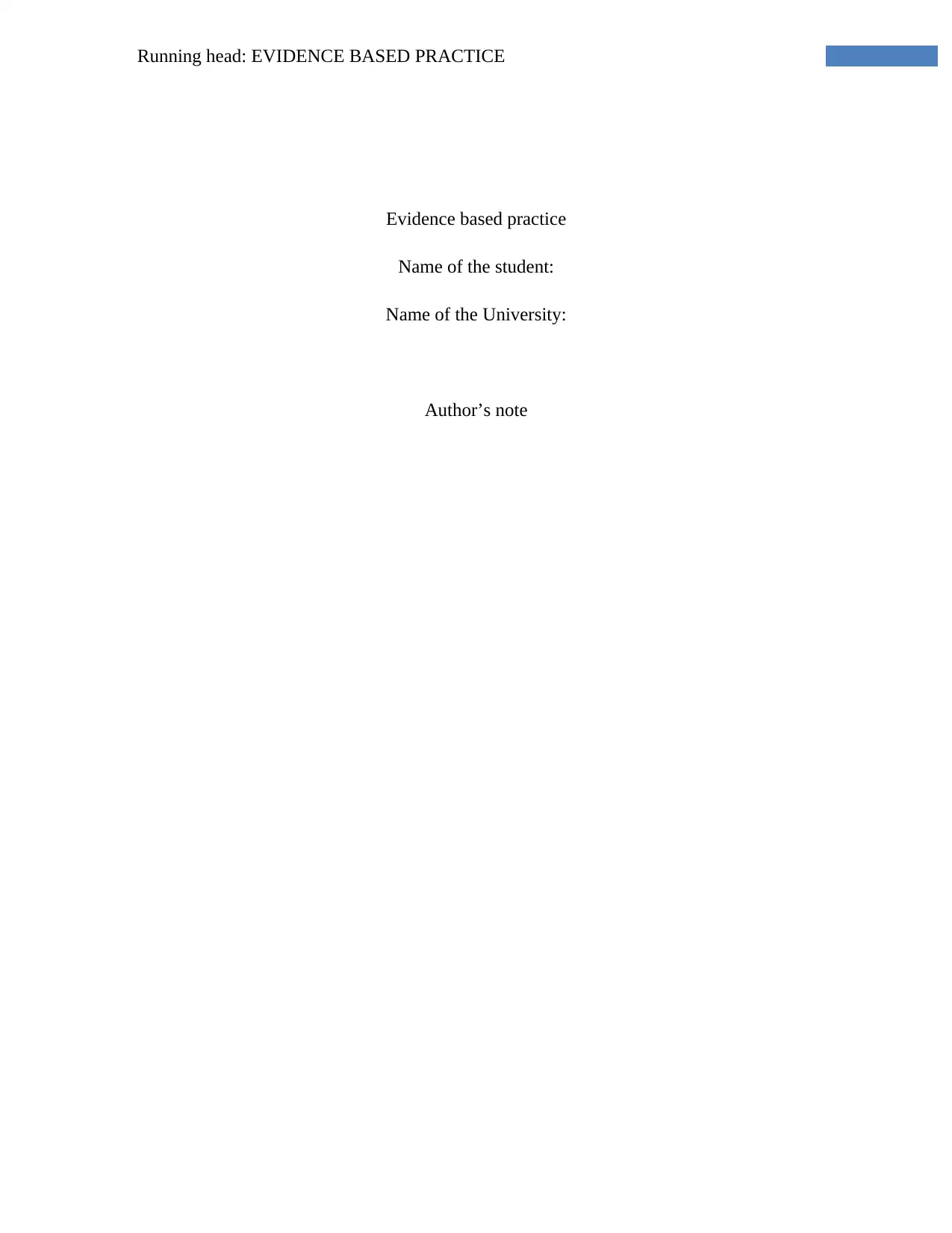
Running head: EVIDENCE BASED PRACTICE
Evidence based practice
Name of the student:
Name of the University:
Author’s note
Evidence based practice
Name of the student:
Name of the University:
Author’s note
Paraphrase This Document
Need a fresh take? Get an instant paraphrase of this document with our AI Paraphraser
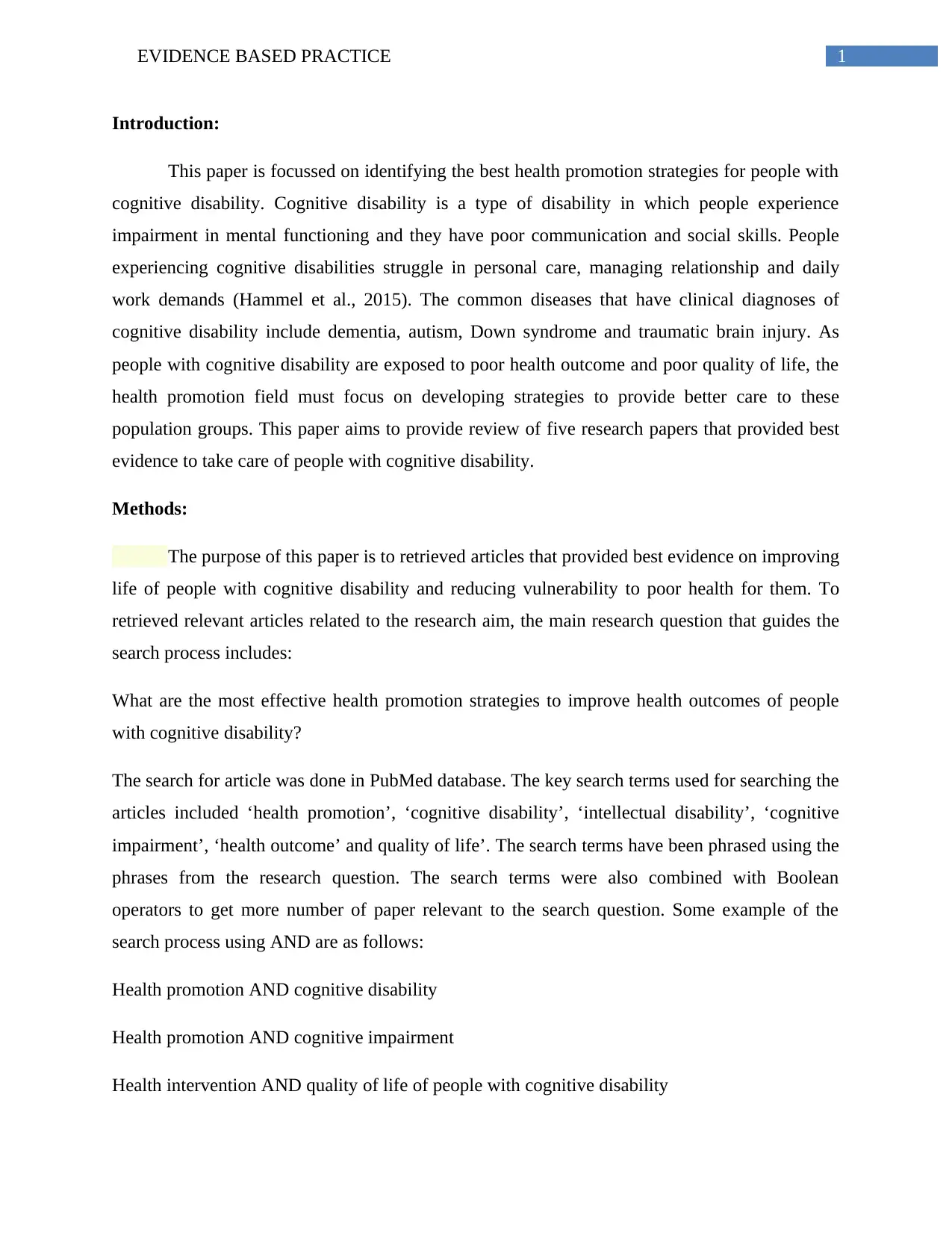
1EVIDENCE BASED PRACTICE
Introduction:
This paper is focussed on identifying the best health promotion strategies for people with
cognitive disability. Cognitive disability is a type of disability in which people experience
impairment in mental functioning and they have poor communication and social skills. People
experiencing cognitive disabilities struggle in personal care, managing relationship and daily
work demands (Hammel et al., 2015). The common diseases that have clinical diagnoses of
cognitive disability include dementia, autism, Down syndrome and traumatic brain injury. As
people with cognitive disability are exposed to poor health outcome and poor quality of life, the
health promotion field must focus on developing strategies to provide better care to these
population groups. This paper aims to provide review of five research papers that provided best
evidence to take care of people with cognitive disability.
Methods:
The purpose of this paper is to retrieved articles that provided best evidence on improving
life of people with cognitive disability and reducing vulnerability to poor health for them. To
retrieved relevant articles related to the research aim, the main research question that guides the
search process includes:
What are the most effective health promotion strategies to improve health outcomes of people
with cognitive disability?
The search for article was done in PubMed database. The key search terms used for searching the
articles included ‘health promotion’, ‘cognitive disability’, ‘intellectual disability’, ‘cognitive
impairment’, ‘health outcome’ and quality of life’. The search terms have been phrased using the
phrases from the research question. The search terms were also combined with Boolean
operators to get more number of paper relevant to the search question. Some example of the
search process using AND are as follows:
Health promotion AND cognitive disability
Health promotion AND cognitive impairment
Health intervention AND quality of life of people with cognitive disability
Introduction:
This paper is focussed on identifying the best health promotion strategies for people with
cognitive disability. Cognitive disability is a type of disability in which people experience
impairment in mental functioning and they have poor communication and social skills. People
experiencing cognitive disabilities struggle in personal care, managing relationship and daily
work demands (Hammel et al., 2015). The common diseases that have clinical diagnoses of
cognitive disability include dementia, autism, Down syndrome and traumatic brain injury. As
people with cognitive disability are exposed to poor health outcome and poor quality of life, the
health promotion field must focus on developing strategies to provide better care to these
population groups. This paper aims to provide review of five research papers that provided best
evidence to take care of people with cognitive disability.
Methods:
The purpose of this paper is to retrieved articles that provided best evidence on improving
life of people with cognitive disability and reducing vulnerability to poor health for them. To
retrieved relevant articles related to the research aim, the main research question that guides the
search process includes:
What are the most effective health promotion strategies to improve health outcomes of people
with cognitive disability?
The search for article was done in PubMed database. The key search terms used for searching the
articles included ‘health promotion’, ‘cognitive disability’, ‘intellectual disability’, ‘cognitive
impairment’, ‘health outcome’ and quality of life’. The search terms have been phrased using the
phrases from the research question. The search terms were also combined with Boolean
operators to get more number of paper relevant to the search question. Some example of the
search process using AND are as follows:
Health promotion AND cognitive disability
Health promotion AND cognitive impairment
Health intervention AND quality of life of people with cognitive disability
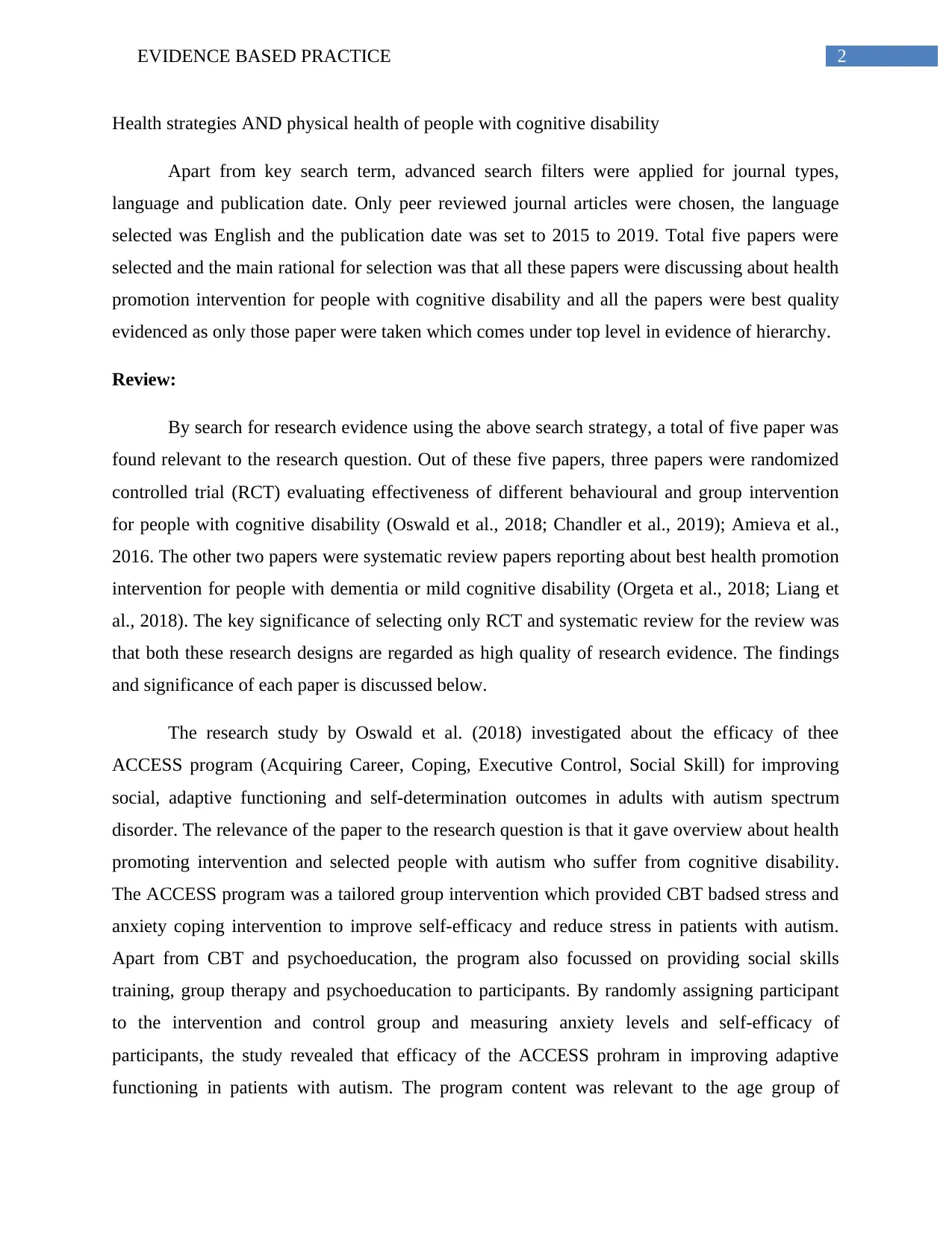
2EVIDENCE BASED PRACTICE
Health strategies AND physical health of people with cognitive disability
Apart from key search term, advanced search filters were applied for journal types,
language and publication date. Only peer reviewed journal articles were chosen, the language
selected was English and the publication date was set to 2015 to 2019. Total five papers were
selected and the main rational for selection was that all these papers were discussing about health
promotion intervention for people with cognitive disability and all the papers were best quality
evidenced as only those paper were taken which comes under top level in evidence of hierarchy.
Review:
By search for research evidence using the above search strategy, a total of five paper was
found relevant to the research question. Out of these five papers, three papers were randomized
controlled trial (RCT) evaluating effectiveness of different behavioural and group intervention
for people with cognitive disability (Oswald et al., 2018; Chandler et al., 2019); Amieva et al.,
2016. The other two papers were systematic review papers reporting about best health promotion
intervention for people with dementia or mild cognitive disability (Orgeta et al., 2018; Liang et
al., 2018). The key significance of selecting only RCT and systematic review for the review was
that both these research designs are regarded as high quality of research evidence. The findings
and significance of each paper is discussed below.
The research study by Oswald et al. (2018) investigated about the efficacy of thee
ACCESS program (Acquiring Career, Coping, Executive Control, Social Skill) for improving
social, adaptive functioning and self-determination outcomes in adults with autism spectrum
disorder. The relevance of the paper to the research question is that it gave overview about health
promoting intervention and selected people with autism who suffer from cognitive disability.
The ACCESS program was a tailored group intervention which provided CBT badsed stress and
anxiety coping intervention to improve self-efficacy and reduce stress in patients with autism.
Apart from CBT and psychoeducation, the program also focussed on providing social skills
training, group therapy and psychoeducation to participants. By randomly assigning participant
to the intervention and control group and measuring anxiety levels and self-efficacy of
participants, the study revealed that efficacy of the ACCESS prohram in improving adaptive
functioning in patients with autism. The program content was relevant to the age group of
Health strategies AND physical health of people with cognitive disability
Apart from key search term, advanced search filters were applied for journal types,
language and publication date. Only peer reviewed journal articles were chosen, the language
selected was English and the publication date was set to 2015 to 2019. Total five papers were
selected and the main rational for selection was that all these papers were discussing about health
promotion intervention for people with cognitive disability and all the papers were best quality
evidenced as only those paper were taken which comes under top level in evidence of hierarchy.
Review:
By search for research evidence using the above search strategy, a total of five paper was
found relevant to the research question. Out of these five papers, three papers were randomized
controlled trial (RCT) evaluating effectiveness of different behavioural and group intervention
for people with cognitive disability (Oswald et al., 2018; Chandler et al., 2019); Amieva et al.,
2016. The other two papers were systematic review papers reporting about best health promotion
intervention for people with dementia or mild cognitive disability (Orgeta et al., 2018; Liang et
al., 2018). The key significance of selecting only RCT and systematic review for the review was
that both these research designs are regarded as high quality of research evidence. The findings
and significance of each paper is discussed below.
The research study by Oswald et al. (2018) investigated about the efficacy of thee
ACCESS program (Acquiring Career, Coping, Executive Control, Social Skill) for improving
social, adaptive functioning and self-determination outcomes in adults with autism spectrum
disorder. The relevance of the paper to the research question is that it gave overview about health
promoting intervention and selected people with autism who suffer from cognitive disability.
The ACCESS program was a tailored group intervention which provided CBT badsed stress and
anxiety coping intervention to improve self-efficacy and reduce stress in patients with autism.
Apart from CBT and psychoeducation, the program also focussed on providing social skills
training, group therapy and psychoeducation to participants. By randomly assigning participant
to the intervention and control group and measuring anxiety levels and self-efficacy of
participants, the study revealed that efficacy of the ACCESS prohram in improving adaptive
functioning in patients with autism. The program content was relevant to the age group of
⊘ This is a preview!⊘
Do you want full access?
Subscribe today to unlock all pages.

Trusted by 1+ million students worldwide
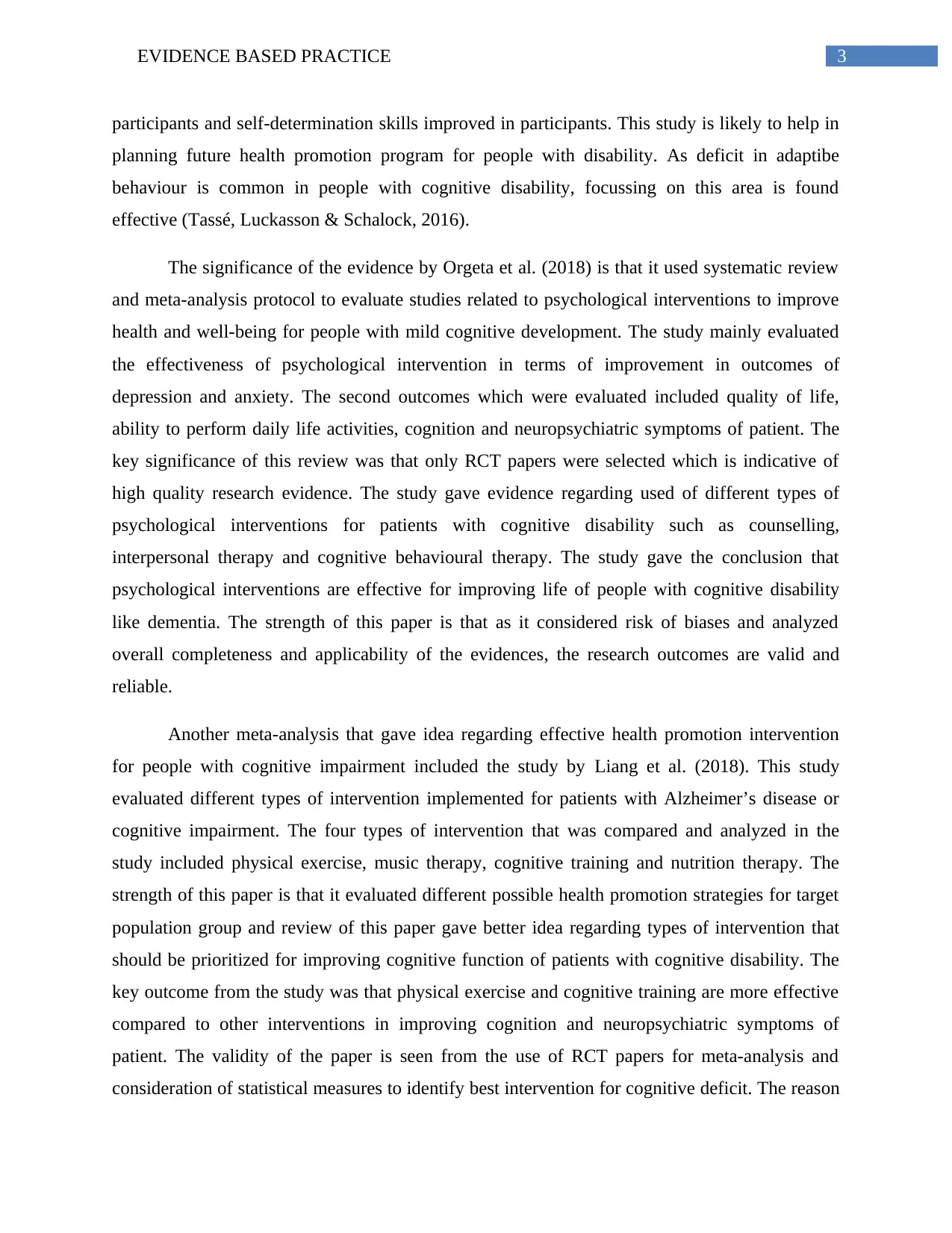
3EVIDENCE BASED PRACTICE
participants and self-determination skills improved in participants. This study is likely to help in
planning future health promotion program for people with disability. As deficit in adaptibe
behaviour is common in people with cognitive disability, focussing on this area is found
effective (Tassé, Luckasson & Schalock, 2016).
The significance of the evidence by Orgeta et al. (2018) is that it used systematic review
and meta-analysis protocol to evaluate studies related to psychological interventions to improve
health and well-being for people with mild cognitive development. The study mainly evaluated
the effectiveness of psychological intervention in terms of improvement in outcomes of
depression and anxiety. The second outcomes which were evaluated included quality of life,
ability to perform daily life activities, cognition and neuropsychiatric symptoms of patient. The
key significance of this review was that only RCT papers were selected which is indicative of
high quality research evidence. The study gave evidence regarding used of different types of
psychological interventions for patients with cognitive disability such as counselling,
interpersonal therapy and cognitive behavioural therapy. The study gave the conclusion that
psychological interventions are effective for improving life of people with cognitive disability
like dementia. The strength of this paper is that as it considered risk of biases and analyzed
overall completeness and applicability of the evidences, the research outcomes are valid and
reliable.
Another meta-analysis that gave idea regarding effective health promotion intervention
for people with cognitive impairment included the study by Liang et al. (2018). This study
evaluated different types of intervention implemented for patients with Alzheimer’s disease or
cognitive impairment. The four types of intervention that was compared and analyzed in the
study included physical exercise, music therapy, cognitive training and nutrition therapy. The
strength of this paper is that it evaluated different possible health promotion strategies for target
population group and review of this paper gave better idea regarding types of intervention that
should be prioritized for improving cognitive function of patients with cognitive disability. The
key outcome from the study was that physical exercise and cognitive training are more effective
compared to other interventions in improving cognition and neuropsychiatric symptoms of
patient. The validity of the paper is seen from the use of RCT papers for meta-analysis and
consideration of statistical measures to identify best intervention for cognitive deficit. The reason
participants and self-determination skills improved in participants. This study is likely to help in
planning future health promotion program for people with disability. As deficit in adaptibe
behaviour is common in people with cognitive disability, focussing on this area is found
effective (Tassé, Luckasson & Schalock, 2016).
The significance of the evidence by Orgeta et al. (2018) is that it used systematic review
and meta-analysis protocol to evaluate studies related to psychological interventions to improve
health and well-being for people with mild cognitive development. The study mainly evaluated
the effectiveness of psychological intervention in terms of improvement in outcomes of
depression and anxiety. The second outcomes which were evaluated included quality of life,
ability to perform daily life activities, cognition and neuropsychiatric symptoms of patient. The
key significance of this review was that only RCT papers were selected which is indicative of
high quality research evidence. The study gave evidence regarding used of different types of
psychological interventions for patients with cognitive disability such as counselling,
interpersonal therapy and cognitive behavioural therapy. The study gave the conclusion that
psychological interventions are effective for improving life of people with cognitive disability
like dementia. The strength of this paper is that as it considered risk of biases and analyzed
overall completeness and applicability of the evidences, the research outcomes are valid and
reliable.
Another meta-analysis that gave idea regarding effective health promotion intervention
for people with cognitive impairment included the study by Liang et al. (2018). This study
evaluated different types of intervention implemented for patients with Alzheimer’s disease or
cognitive impairment. The four types of intervention that was compared and analyzed in the
study included physical exercise, music therapy, cognitive training and nutrition therapy. The
strength of this paper is that it evaluated different possible health promotion strategies for target
population group and review of this paper gave better idea regarding types of intervention that
should be prioritized for improving cognitive function of patients with cognitive disability. The
key outcome from the study was that physical exercise and cognitive training are more effective
compared to other interventions in improving cognition and neuropsychiatric symptoms of
patient. The validity of the paper is seen from the use of RCT papers for meta-analysis and
consideration of statistical measures to identify best intervention for cognitive deficit. The reason
Paraphrase This Document
Need a fresh take? Get an instant paraphrase of this document with our AI Paraphraser
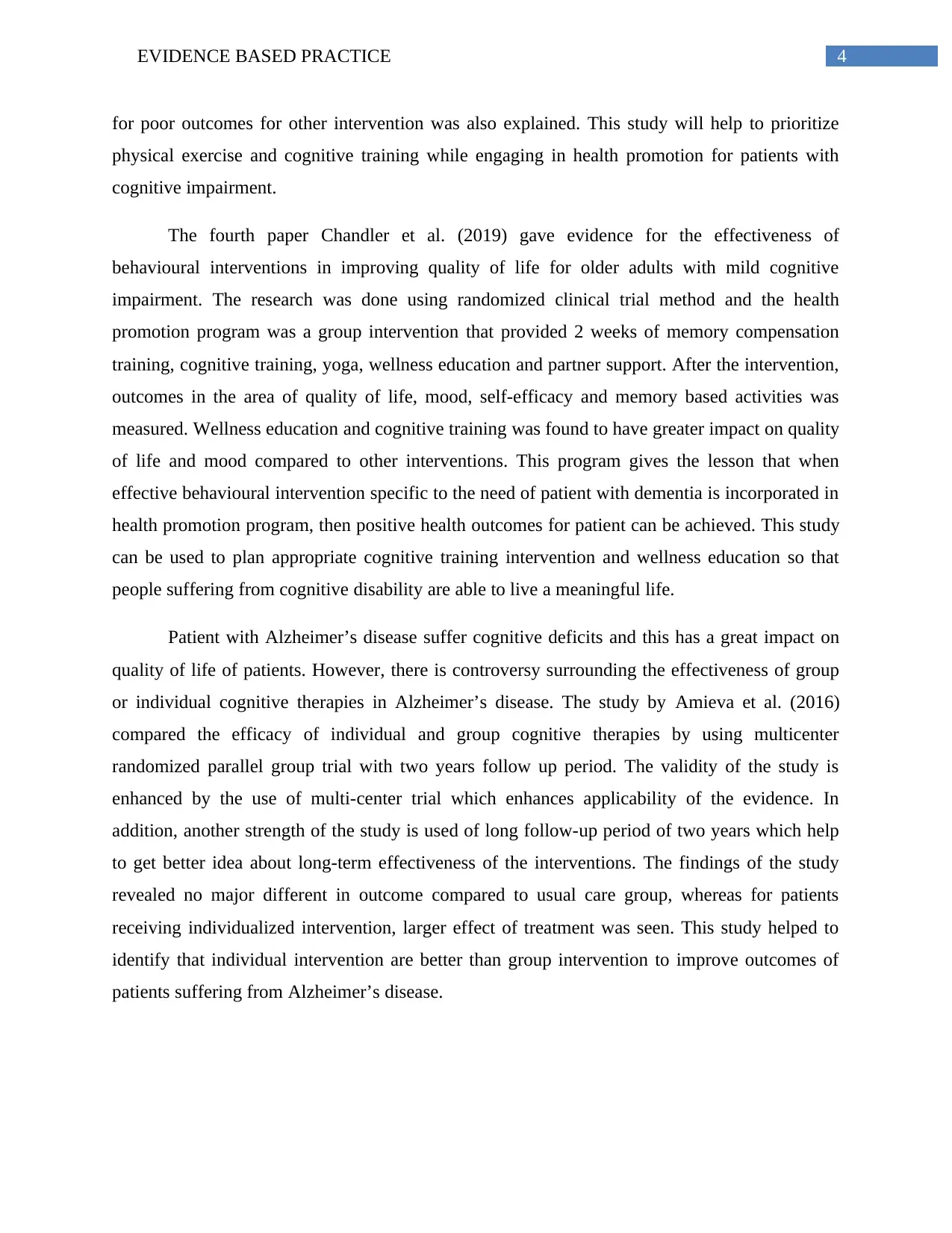
4EVIDENCE BASED PRACTICE
for poor outcomes for other intervention was also explained. This study will help to prioritize
physical exercise and cognitive training while engaging in health promotion for patients with
cognitive impairment.
The fourth paper Chandler et al. (2019) gave evidence for the effectiveness of
behavioural interventions in improving quality of life for older adults with mild cognitive
impairment. The research was done using randomized clinical trial method and the health
promotion program was a group intervention that provided 2 weeks of memory compensation
training, cognitive training, yoga, wellness education and partner support. After the intervention,
outcomes in the area of quality of life, mood, self-efficacy and memory based activities was
measured. Wellness education and cognitive training was found to have greater impact on quality
of life and mood compared to other interventions. This program gives the lesson that when
effective behavioural intervention specific to the need of patient with dementia is incorporated in
health promotion program, then positive health outcomes for patient can be achieved. This study
can be used to plan appropriate cognitive training intervention and wellness education so that
people suffering from cognitive disability are able to live a meaningful life.
Patient with Alzheimer’s disease suffer cognitive deficits and this has a great impact on
quality of life of patients. However, there is controversy surrounding the effectiveness of group
or individual cognitive therapies in Alzheimer’s disease. The study by Amieva et al. (2016)
compared the efficacy of individual and group cognitive therapies by using multicenter
randomized parallel group trial with two years follow up period. The validity of the study is
enhanced by the use of multi-center trial which enhances applicability of the evidence. In
addition, another strength of the study is used of long follow-up period of two years which help
to get better idea about long-term effectiveness of the interventions. The findings of the study
revealed no major different in outcome compared to usual care group, whereas for patients
receiving individualized intervention, larger effect of treatment was seen. This study helped to
identify that individual intervention are better than group intervention to improve outcomes of
patients suffering from Alzheimer’s disease.
for poor outcomes for other intervention was also explained. This study will help to prioritize
physical exercise and cognitive training while engaging in health promotion for patients with
cognitive impairment.
The fourth paper Chandler et al. (2019) gave evidence for the effectiveness of
behavioural interventions in improving quality of life for older adults with mild cognitive
impairment. The research was done using randomized clinical trial method and the health
promotion program was a group intervention that provided 2 weeks of memory compensation
training, cognitive training, yoga, wellness education and partner support. After the intervention,
outcomes in the area of quality of life, mood, self-efficacy and memory based activities was
measured. Wellness education and cognitive training was found to have greater impact on quality
of life and mood compared to other interventions. This program gives the lesson that when
effective behavioural intervention specific to the need of patient with dementia is incorporated in
health promotion program, then positive health outcomes for patient can be achieved. This study
can be used to plan appropriate cognitive training intervention and wellness education so that
people suffering from cognitive disability are able to live a meaningful life.
Patient with Alzheimer’s disease suffer cognitive deficits and this has a great impact on
quality of life of patients. However, there is controversy surrounding the effectiveness of group
or individual cognitive therapies in Alzheimer’s disease. The study by Amieva et al. (2016)
compared the efficacy of individual and group cognitive therapies by using multicenter
randomized parallel group trial with two years follow up period. The validity of the study is
enhanced by the use of multi-center trial which enhances applicability of the evidence. In
addition, another strength of the study is used of long follow-up period of two years which help
to get better idea about long-term effectiveness of the interventions. The findings of the study
revealed no major different in outcome compared to usual care group, whereas for patients
receiving individualized intervention, larger effect of treatment was seen. This study helped to
identify that individual intervention are better than group intervention to improve outcomes of
patients suffering from Alzheimer’s disease.
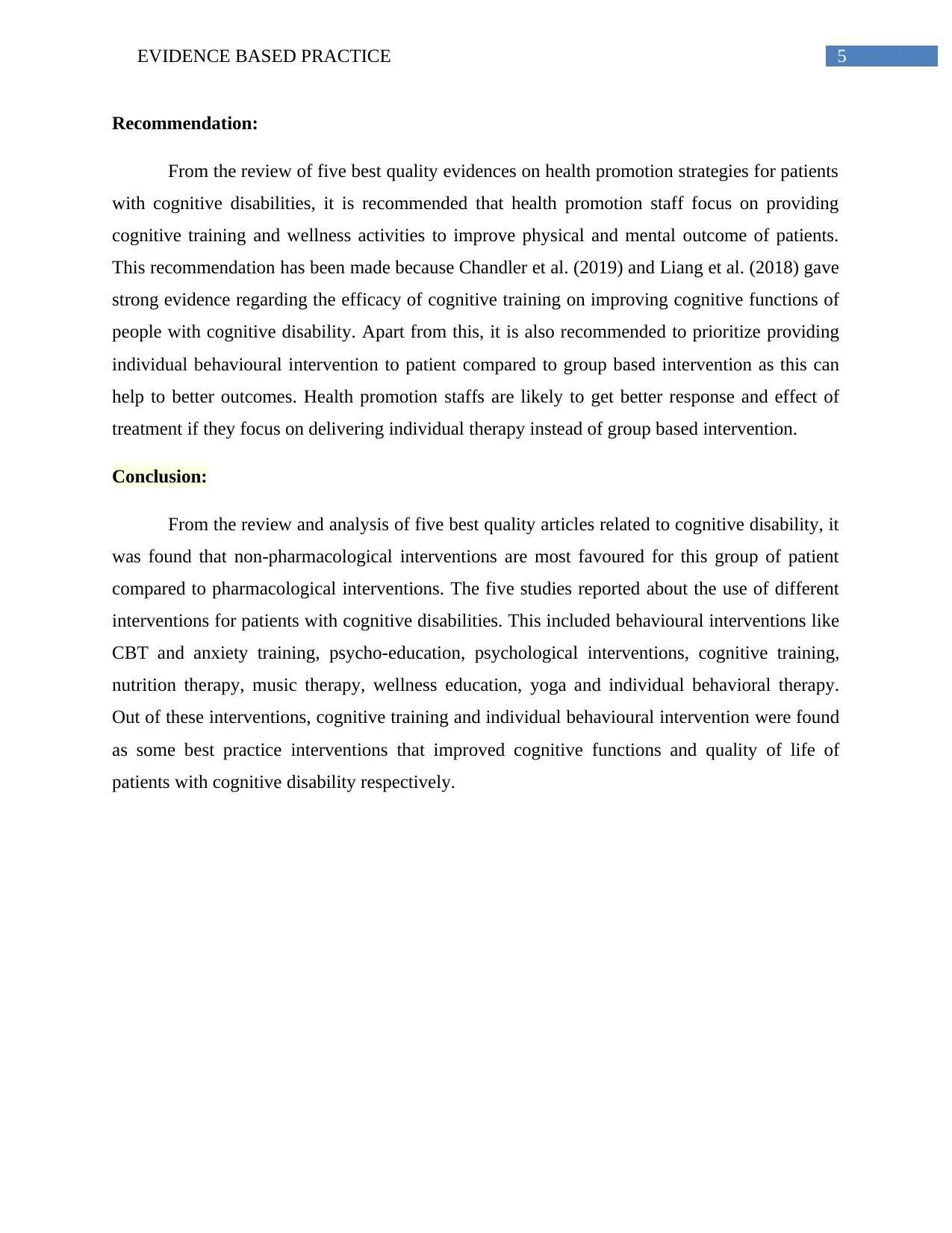
5EVIDENCE BASED PRACTICE
Recommendation:
From the review of five best quality evidences on health promotion strategies for patients
with cognitive disabilities, it is recommended that health promotion staff focus on providing
cognitive training and wellness activities to improve physical and mental outcome of patients.
This recommendation has been made because Chandler et al. (2019) and Liang et al. (2018) gave
strong evidence regarding the efficacy of cognitive training on improving cognitive functions of
people with cognitive disability. Apart from this, it is also recommended to prioritize providing
individual behavioural intervention to patient compared to group based intervention as this can
help to better outcomes. Health promotion staffs are likely to get better response and effect of
treatment if they focus on delivering individual therapy instead of group based intervention.
Conclusion:
From the review and analysis of five best quality articles related to cognitive disability, it
was found that non-pharmacological interventions are most favoured for this group of patient
compared to pharmacological interventions. The five studies reported about the use of different
interventions for patients with cognitive disabilities. This included behavioural interventions like
CBT and anxiety training, psycho-education, psychological interventions, cognitive training,
nutrition therapy, music therapy, wellness education, yoga and individual behavioral therapy.
Out of these interventions, cognitive training and individual behavioural intervention were found
as some best practice interventions that improved cognitive functions and quality of life of
patients with cognitive disability respectively.
Recommendation:
From the review of five best quality evidences on health promotion strategies for patients
with cognitive disabilities, it is recommended that health promotion staff focus on providing
cognitive training and wellness activities to improve physical and mental outcome of patients.
This recommendation has been made because Chandler et al. (2019) and Liang et al. (2018) gave
strong evidence regarding the efficacy of cognitive training on improving cognitive functions of
people with cognitive disability. Apart from this, it is also recommended to prioritize providing
individual behavioural intervention to patient compared to group based intervention as this can
help to better outcomes. Health promotion staffs are likely to get better response and effect of
treatment if they focus on delivering individual therapy instead of group based intervention.
Conclusion:
From the review and analysis of five best quality articles related to cognitive disability, it
was found that non-pharmacological interventions are most favoured for this group of patient
compared to pharmacological interventions. The five studies reported about the use of different
interventions for patients with cognitive disabilities. This included behavioural interventions like
CBT and anxiety training, psycho-education, psychological interventions, cognitive training,
nutrition therapy, music therapy, wellness education, yoga and individual behavioral therapy.
Out of these interventions, cognitive training and individual behavioural intervention were found
as some best practice interventions that improved cognitive functions and quality of life of
patients with cognitive disability respectively.
⊘ This is a preview!⊘
Do you want full access?
Subscribe today to unlock all pages.

Trusted by 1+ million students worldwide
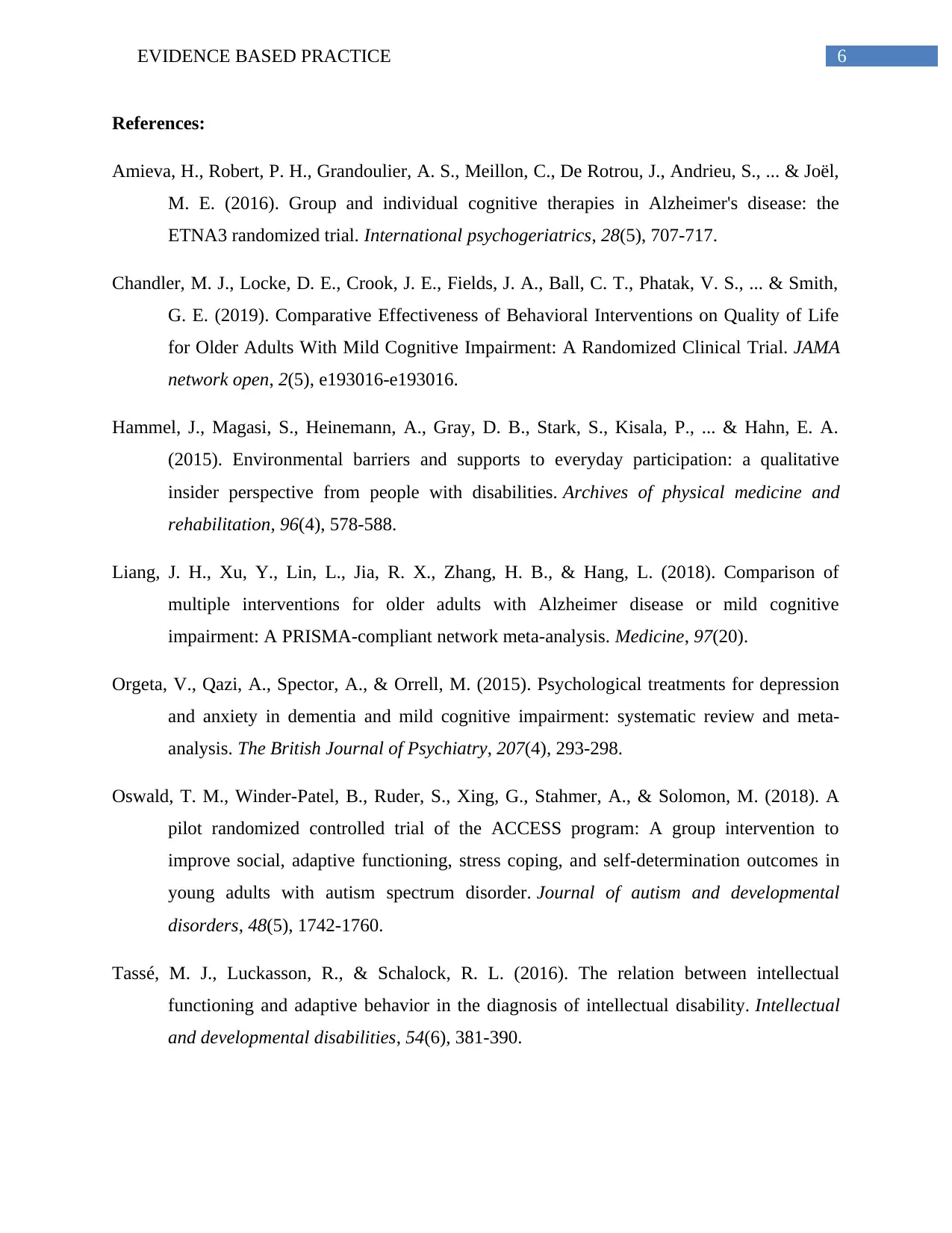
6EVIDENCE BASED PRACTICE
References:
Amieva, H., Robert, P. H., Grandoulier, A. S., Meillon, C., De Rotrou, J., Andrieu, S., ... & Joël,
M. E. (2016). Group and individual cognitive therapies in Alzheimer's disease: the
ETNA3 randomized trial. International psychogeriatrics, 28(5), 707-717.
Chandler, M. J., Locke, D. E., Crook, J. E., Fields, J. A., Ball, C. T., Phatak, V. S., ... & Smith,
G. E. (2019). Comparative Effectiveness of Behavioral Interventions on Quality of Life
for Older Adults With Mild Cognitive Impairment: A Randomized Clinical Trial. JAMA
network open, 2(5), e193016-e193016.
Hammel, J., Magasi, S., Heinemann, A., Gray, D. B., Stark, S., Kisala, P., ... & Hahn, E. A.
(2015). Environmental barriers and supports to everyday participation: a qualitative
insider perspective from people with disabilities. Archives of physical medicine and
rehabilitation, 96(4), 578-588.
Liang, J. H., Xu, Y., Lin, L., Jia, R. X., Zhang, H. B., & Hang, L. (2018). Comparison of
multiple interventions for older adults with Alzheimer disease or mild cognitive
impairment: A PRISMA-compliant network meta-analysis. Medicine, 97(20).
Orgeta, V., Qazi, A., Spector, A., & Orrell, M. (2015). Psychological treatments for depression
and anxiety in dementia and mild cognitive impairment: systematic review and meta-
analysis. The British Journal of Psychiatry, 207(4), 293-298.
Oswald, T. M., Winder-Patel, B., Ruder, S., Xing, G., Stahmer, A., & Solomon, M. (2018). A
pilot randomized controlled trial of the ACCESS program: A group intervention to
improve social, adaptive functioning, stress coping, and self-determination outcomes in
young adults with autism spectrum disorder. Journal of autism and developmental
disorders, 48(5), 1742-1760.
Tassé, M. J., Luckasson, R., & Schalock, R. L. (2016). The relation between intellectual
functioning and adaptive behavior in the diagnosis of intellectual disability. Intellectual
and developmental disabilities, 54(6), 381-390.
References:
Amieva, H., Robert, P. H., Grandoulier, A. S., Meillon, C., De Rotrou, J., Andrieu, S., ... & Joël,
M. E. (2016). Group and individual cognitive therapies in Alzheimer's disease: the
ETNA3 randomized trial. International psychogeriatrics, 28(5), 707-717.
Chandler, M. J., Locke, D. E., Crook, J. E., Fields, J. A., Ball, C. T., Phatak, V. S., ... & Smith,
G. E. (2019). Comparative Effectiveness of Behavioral Interventions on Quality of Life
for Older Adults With Mild Cognitive Impairment: A Randomized Clinical Trial. JAMA
network open, 2(5), e193016-e193016.
Hammel, J., Magasi, S., Heinemann, A., Gray, D. B., Stark, S., Kisala, P., ... & Hahn, E. A.
(2015). Environmental barriers and supports to everyday participation: a qualitative
insider perspective from people with disabilities. Archives of physical medicine and
rehabilitation, 96(4), 578-588.
Liang, J. H., Xu, Y., Lin, L., Jia, R. X., Zhang, H. B., & Hang, L. (2018). Comparison of
multiple interventions for older adults with Alzheimer disease or mild cognitive
impairment: A PRISMA-compliant network meta-analysis. Medicine, 97(20).
Orgeta, V., Qazi, A., Spector, A., & Orrell, M. (2015). Psychological treatments for depression
and anxiety in dementia and mild cognitive impairment: systematic review and meta-
analysis. The British Journal of Psychiatry, 207(4), 293-298.
Oswald, T. M., Winder-Patel, B., Ruder, S., Xing, G., Stahmer, A., & Solomon, M. (2018). A
pilot randomized controlled trial of the ACCESS program: A group intervention to
improve social, adaptive functioning, stress coping, and self-determination outcomes in
young adults with autism spectrum disorder. Journal of autism and developmental
disorders, 48(5), 1742-1760.
Tassé, M. J., Luckasson, R., & Schalock, R. L. (2016). The relation between intellectual
functioning and adaptive behavior in the diagnosis of intellectual disability. Intellectual
and developmental disabilities, 54(6), 381-390.
1 out of 7
Related Documents
Your All-in-One AI-Powered Toolkit for Academic Success.
+13062052269
info@desklib.com
Available 24*7 on WhatsApp / Email
![[object Object]](/_next/static/media/star-bottom.7253800d.svg)
Unlock your academic potential
Copyright © 2020–2026 A2Z Services. All Rights Reserved. Developed and managed by ZUCOL.





